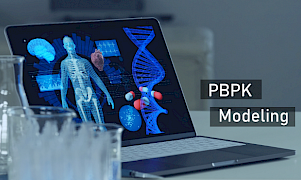For a better translation from non-clinical to human studies
Physiologically Based PharmacoKinetic (PBPK) modeling is a mechanistic approach to predict the absorption, distribution, metabolism and excretion of drugs on the basis of:
- Anatomy and physiology of human or animal body
- Physicochemical properties of the drug
- In vitro data on biotransformation
- Transport of the drug
Connecting all this information in one model is possible with PBPK analysis to help you better understand the behavior of your compound and its preclinical and clinical development.
Your company already has data from preclinical studies; your drug candidate has been tested on animals; you have investigated metabolism and transporter in in vitro experimentations: these results allow to go further and start a phase I study on humans.
The PBPK study approach enables you to test in silico different dosing treatments that will be evaluated in first-in-human studies (FIH).
In addition, by avoiding unnecessary trials on healthy volunteers, PBPK can also be considered as the most adapted tool to:
- Evaluate the likely magnitude of a drug-drug interaction
- Determine PK in specific population (Pediatric, Hepatic or Renal Impairment)
- Support the clinical development of a new formulation or a food effect.
PhInc. Modeling pioneered the use of GastroPlus® software. For many years, we have enhanced our expertise and established a strong partnership with SimulationsPlus® to promote the best use of PBPK modeling in drug development.







